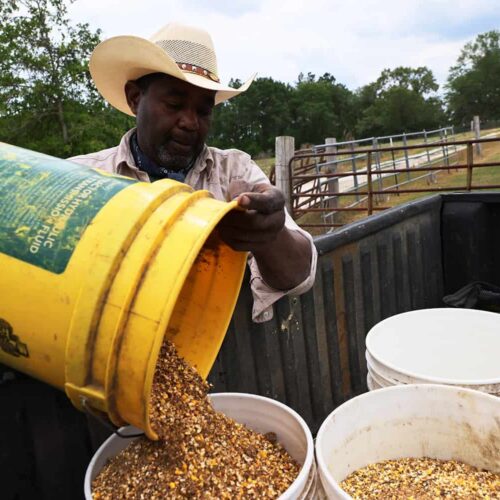Introduction
On his first day in office, President Joe Biden signed an executive order putting racial equity at the center of policy, programs and funding, a response to the racial justice push that helped propel him to victory.
One notable effort is a $4 billion debt relief program, included in the American Rescue Plan Act passed earlier this year. The program would cancel qualifying farm loan debts owed by farmers of color to the Farm Service Agency under the U.S. Department of Agriculture (USDA). It gave renewed hope to those farmers who have faced long and documented discrimination from the Agriculture Department.
But then about a dozen lawsuits were filed in Florida, Tennessee, Texas and across the West and Midwest, alleging that the Biden administration program discriminates against white farmers.
Advocates and legal experts say one way to save the program may be by taking race out of the eligibility criteria. They’re looking to Congress to step in. Otherwise, the program risks losing in court, which could have wider ramifications and even gut affirmative action programs.
“This is low-hanging fruit for political weaponizing,” said Sheryll Cashin, a law professor at Georgetown Law who focuses on civil rights and social justice. “These lawsuits are just as much about politics as they are about law.”
Stephen Miller along with other former senior Trump administration officials are behind a newly created legal group representing one of the plaintiffs: Texas Agriculture Commissioner and rancher Sid Miller.
Other legal groups representing plaintiffs are the Pacific Legal Foundation, who has opposed affirmative action policies, and the Wisconsin Institute for Law and Liberty, which is representing about a dozen white farmers. Judges paused the program and allowed a class action suit to proceed.
But legal experts and advocates say there’s a colorblind way forward, by narrowly defining beneficiaries or focusing policies on the pattern of discrimination rather the race of farmers.
“There is a lot of this systemic racism that we still need to undo in this country, but just pointing to that as a justification for these race-based programs — given the (conservative) Supreme Court presently and the state of the judiciary — that’s probably not enough to pass muster in a legal challenge,” said Eric Berger, a constitutional law professor at the University of Nebraska.
Supporters of the program often point to how much more white farmers have received from the federal government in comparison to farmers of color. Take the federal government’s response to two recent crises: White farmers received nearly all of Trump’s payments to compensate farmers during his administration’s trade war with China. And according to legal filings, white farmers disproportionately benefited from the $9.2 billion farmers received through the USDA’s first Coronavirus Food Assistance Program.
“We have systems that over-invest in policies that benefit whites and disinvest in people of color,” said Cashin, author of “White Space, Black Hood: Opportunity Hoarding and Segregation in the Age of Inequality.” “These programs are worth fighting for if we’re going to have real racial equity.”
Legal experts say that if the program’s legal challenges were to reach the Supreme Court, its decision would likely threaten affirmative action programs. “This is a very conservative Supreme Court that’s probably hostile to affirmative action in any form,” Berger said.
Advocates for Black farmers want Congress to alter the definition of farmers who are eligible for debt relief by removing race from the criteria. Instead, eligibility would be determined by whether the farmer filed a discrimination complaint with the USDA, has been eligible for a federal court certified class based on discrimination, which would cover Black and Native American farmers, or could show they were subject to specific mistreatment.
“If we don’t change the definition, farmers won’t be getting debt relief,” said Lloyd Wright, a farmer and former director of the USDA Office of Civil Rights, 1997-98.
Another potential solution is a bill introduced by U.S. Sen. Kirsten Gillibrand (D-NY). It would provide one-time debt forgiveness of up to $250,000 to nearly 40,000 small farmers. Eligible farms would have an average adjusted gross income of up to $300,000 for the previous five years.
With the debt relief program in limbo, Rural Coalition, the National Family Farm Coalition and other groups are calling on Democrats in Congress to provide $10 billion in debt relief plus $38 billion for climate-friendly agriculture resources and programs to aid small and medium-sized producers.
“If we care about [Black, Indigenous, People of Color] farmers and all farmers, we need to look at all the pieces that they need,” said Lorette Picciano, executive director of the Rural Coalition.
In the meantime, advocates fear the program’s uncertain future will create massive confusion. Farmers may fail to make payments when their loans are due, or they may unintentionally violate their loan agreements, advocates said. Some made plans based on the promise of loan forgiveness and now they’ve put their livelihoods at risk.
As for Georgia farmer Eddie Slaughter, who is Black, the future of the program has always been clear. He told Public Integrity in May that if payments weren’t released by Memorial Day, he didn’t think they ever would be. “Why is it that equal justice under the law doesn’t exist for the Black and the poor?”
April Simpson is a senior reporter at the Center for Public Integrity. She can be reached at asimpson@publicintegrity.org. Follow her on Twitter @aprilleticia.
Read more in Inside Public Integrity
Cheated at Work
Cheating workers on the U.S.-Mexico border
U.S. Department of Labor officials have unveiled a pattern used by American companies to underpay Mexican workers.
Watchdog newsletter
Proposed iPhone protections could put LGBTQ youth at risk
Digital privacy groups worry that the protections could create a backdoor to widespread surveillance and engender abuse.



Join the conversation
Show Comments